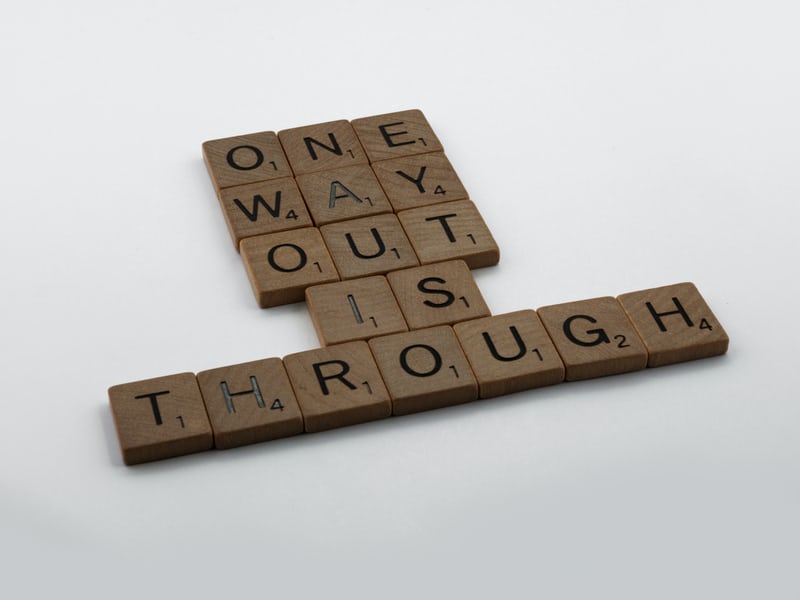|
Sometimes we can be so hard on ourselves. Our inner dialog can be so harsh and cruel. We extend so much kindness to everyone else in our lives, but we have almost no patience or compassion for ourselves. What if we tried to approach this differently? What if we infused our lives with more self-compassion and self-love?
Let's explore the transformative power of self-compassion as a tool for resilience. Here are a few practical strategies to foster self-compassion and navigate the journey toward healing. 1. Practice Mindful Self-Compassion: Mindful self-compassion involves acknowledging your pain with a gentle, understanding attitude. Embrace the reality of your emotions without judgment. When you notice self-critical thoughts arising, counteract them with self-compassionate affirmations. Treat yourself with the same kindness you'd offer a dear friend. 2. Establish a Supportive Routine: Depression can disrupt daily routines, making even simple tasks feel overwhelming. Establish a manageable routine that includes self-care activities. Break tasks into smaller steps, and celebrate each accomplishment. Consistency fosters a sense of stability and control. 3. Engage in Meaningful Activities: Identify activities that bring a sense of purpose and joy. Whether it's pursuing a hobby, volunteering, or spending time with loved ones, engaging in meaningful activities can lift the veil of depression. Create a list of activities that resonate with you, and aim to incorporate them into your routine. 4. Set Realistic Goals: Set achievable goals and celebrate your progress, no matter how small. Depression often saps energy and motivation, so break tasks into manageable steps. Celebrate the victories, and be patient with yourself on the challenging days. 5. Connect with Others: Isolation can deepen the grip of depression. Reach out to friends, family, or support groups. Share your feelings and allow others to offer companionship and understanding. Connection is a powerful antidote to loneliness and can help lift our mood and self-concept too. 6. Seek Professional Support: Sometimes we need more tools. A trained therapist can provide guidance, validation, and practical tools to help you manage depressive symptoms. Seeking professional help is a courageous step toward healing. Remember, self-compassion is something we all deserve. Be gentle with yourself as you explore these strategies. Every step you take toward self-compassion is a step toward reclaiming your inner strength and resilience.
1 Comment
Lately, I've been paying attention to the sky more. The winter sunsets have been so colorful and peaceful. I'm noticing them on my evening walks or when I'm driving around and it got me thinking about the art of noticing.
Life can sometimes feel like a big storm. It can suddenly come out of nowhere and feel all consuming. If you find yourself struggling to navigate the ups and downs of anxiety, consider the transformative power of mindfulness and self-care. 1. Ground Yourself in the Present: Start by pausing. Then ground yourself in the present moment. Notice the sensations in your body, the rhythm of your breath. Acknowledge that, in this moment, you are safe. One effective technique is the 5-4-3-2-1 grounding exercise. Identify 5 things you can see, 4 things you can touch, 3 things you can hear, 2 things you can smell, and 1 thing you can taste. 2. Cultivate a Mindful Routine: Create a daily routine that incorporates mindfulness. Whether it's a morning meditation, a mindful walk outside, or a few moments of deep breathing before bed, these rituals can anchor you in the present and provide a buffer against the waves of anxiety that we sometimes feel. 3. Prioritize Self-Care Practices: Self-care is not a luxury; it's a necessity for mental well-being. Identify activities that bring you joy and relaxation. Think about the little things that bring you the most joy. Schedule regular self-care breaks to recharge and reset. Set your phone aside, turn off notifications and allow yourself to be fully present with whatever is right in front of you. 4. Challenge Negative Thoughts: Anxiety often thrives on negative thought patterns. Challenge and reframe these thoughts. Ask yourself, "Is this thought based on facts, or is it a distortion and a product of my anxiety?" Replace irrational thoughts with more balanced perspectives, fostering a healthier mindset. 5. Reach Out for Support: You don't have to face anxiety alone. Share your feelings with a trusted friend, family member, or with your therapist. Connection is a powerful antidote to anxiety. Opening up allows others to offer support and understanding. Remember, navigating anxiety is a journey, not a destination. Be patient and compassionate with yourself as you integrate these practices into your life. Small steps can lead to significant changes, and by prioritizing mindful self-care, you're taking a proactive approach to reducing your anxiety. If you need more support, our team is here for you. That’s a very good question that I’ve also been asking myself lately. Spend five minutes watching the news and it’s easy to shift into a numb, apathetic, hopeless state.
Between the Russia and Ukraine war, the climate crisis, a global pandemic and the ongoing intense division in the US, it’s tempting to allow ourselves to slip into a state of reckless abandon. But, come back to yourself for a moment. Lean into these three critical steps. One - pause. Pause when you begin to feel overwhelmed and stop yourself from spiraling. Pay attention to how your body feels and what thoughts are rolling through your mind. Then two, ask yourself what is needed. Begin with the most fundamental self-care awareness you have. Are you hungry, thirsty, tired or lonely? What needs the most attention immediately? Do that. And only that. Then three, once you’ve paused and addressed your foundational self-care needs, then come back to the enormous significance of what’s right in front of you. Come back to the importance of your micro lens. Return to a state of focusing on making change in your own personal life and in the lives immediately impacted by you. What can you do right here, right now that might feel good or right? When things feel like they’re out of our control, our knee jerk response is to give up. I’d like to invite you to shift that from apathy to action. Return to what you can control. Return to micro level decisions and do something small. Just focus on a tiny action. What will you make for your next meal? How beautiful does that plant look in your backyard? Reach out to a friend and check in to connect. Take a short walk around the block. This always helps us clear our minds and soften our stress response. I believe in the physics of a ripple effect. It’s easy to see what happens when you toss a stone into a lake. From your point of impact, a ripple is created in the innermost circle around where the stone falls into the water. From there, another ripple occurs and another ripple and so on. When you feel ready and if it feels right to you, you can consider donating your time, money, knowledge or expertise to a cause that matters most to you now. Any tiny positive action that you can create will undoubtedly create a small ripple around you. I still believe one person has the power to impact what’s right in front of them and ultimately that’s how real change begins. Please remember, you’re a human - having a very normal human response to a completely abnormal set of life circumstances and the time to be gentle with yourself is now.
Lately, I’ve been hearing a trend in my practice. Many of my clients are struggling in this phase of the pandemic where we have a little distance from the peak crisis, trauma and fear, but we are still cautiously proceeding forward with uncertainty. After so much isolation and unknown, it’s hard for us to merge back towards normal. In addition, many of us are questioning what our post-pandemic life should look and feel like. We’ve been given a chance to halt and in that pause we can’t help but question ‘was the way I was doing it before really working?’ We are in what feels like a collective existential question and while that’s not a bad thing - it can be very destabilizing. If I know one thing to be true - it’s that anxiety spikes when we experience a perception (real or imagined) of being trapped and uncertain. We had both of these during the pandemic. So, you take a global population who has just shifted into hypervigilance and you shake up everything they know to be helpful in maintaining a sense of health and wellbeing, you remove all their access to what helps them cope and feel stable, and you have a heck of a lot of people in this world left asking the deep questions about who they are now and where they really want to be. All this to say - YOU. ARE. HUMAN. And you’re likely having a tender, vulnerable, fragile and completely normal human response to something you’ve never before experienced in your lifetime. The great thing about this very moment in time is that in it - is opportunity. The opportunity to really ask ourselves - what needs to change? What is possible now? How do we want to shift? What aspects of ourselves or of our lives do we need to release or let go of and equally, what are we bringing in with truth, honor and intentionality? As a therapist, I have the privilege of holding space for the most intimate questions you ask yourself and I get to witness you discover answers in what is sometimes the most courageous space I could ever imagine holding with another human on earth. The past year and a half has been the most challenging period of my entire professional career - and yet the most richly rewarding too. Something about the pandemic has invited you to accelerate action to rid yourself of the unhealthy aspects, habits or relationships that no longer serve your highest good. I have great reverence for you in your brave, bold steps towards emerging into the version of yourself that feels aligned with truth. You’ve stopped hiding. You’re awake now. You’ve made resolute decisions (large and small) to take real action on the things you’ve been contemplating and questioning for a long time. I’ve heard you say…. “It’s time to leave this relationship. This job. This home. I’ve decided to have a baby. We’re getting married. I’m going back to school. I’m changing the way I communicate with people. The way I hold those boundaries. How I allow people to treat me. I’ve stopped drinking. I am taking better care of myself - for myself. I’m not going back to the way I used to do that. Period.” And like you, I too have been moving through the same space. Staying present to the uncertainty and fear and questioning what was working and what needs support to change and shift. The pandemic invited me to reinvent the way I serve my clients. After 20 years of working with clients face to face in the same room, I was forced to pivot to telehealth. I let go of my brick and mortar office and decided to open a group practice in order to keep up with the demand for support that my caseload could no longer sustain. After 8 years of supporting my husband and his ownership and management of Cornwall Bakery, we’ve decided it's time to close that chapter too. Covid asked us to look closely at time and how time was moving in our lives. In a really strange way, I believe the pandemic brought the concept of our own mortality closer to all of us and ultimately I feel it’s the reason why so many of these aspects of our lives are in a period of acceleration and declaration. We’ve been invited to ask ourselves the same questions you’re facing. What’s working now? What isn’t? What needs to shift. How do we want to spend our lives, our time, our energy? What brings joy and meaning? What feels aligned with our truth and who we are? The answers invited us to pivot and while it’s hard to close our bakery, it feels like the timing is also perfect. Doesn’t it feel like the world is screaming “wake up - the time is NOW!” If something in your life doesn’t feel supportive, healthy, meaningful or grounded in truth, maybe it’s time. The only way we get to do this though, is by staying present and staying connected with ourselves as we fumble and process through our own totally normal, often messy, always hard and wonderful human reactions to real human emotions. Be gentle, Megan It’s hard to believe it’s been about a year now we’ve been living under a pandemic. When I think back to this time last year, I was starting to feel a sense of urgency to stock up on supplies not knowing exactly what the coming weeks would bring. Never in a million years did I imagine that one year later we would still be in this and that our lives would look and feel so different!
There’s been so much loss this year. So many have lost loved ones, lost jobs, lost a sense of freedom, safety and security. But as a therapist, I also have the privileged perspective of witnessing resiliency, hope and our unbelievable capacity for adaptation. After all this, I can truly say I’m inspired by the human spirit. And I believe in possibility. I know, without a doubt that people have the capacity to survive and ultimately we do move forward, even as difficult as it may be. I’ve walked next to you this year. I heard your fears. I watched you face impossible pain. I saw you find creative solutions to problems you never anticipated having. You somehow woke up every morning and continued to breathe through the day even when you felt completely defeated, alone and afraid. I wish everyone could see what I see. I wish people who are currently in despair could have the perspective that therapists have. That they could see how humans survive trauma, tragedy and struggle. That it is possible to do what feels impossible. I’ve worked with so many clients over the years who start their therapy process in deep crisis and over time, over many weeks and months and sometimes even years, after endless patience and gentleness, they begin to heal, shift and even thrive again. So even though we’re here now - a year away from where we started and we still don’t know exactly what’s next, what we do know is that we can face difficult things and survive. We know that when it comes to facing adversity, we must go in and through it. There are no shortcuts and there is no way around. But you never have to go it alone and sometimes facing hard things with someone by your side makes it all seem possible. We know even the most difficult things we face in our lifetime are temporary. And I know for a fact that humans have incredible resilience and strength and that there’s always hope and possibility even when we cannot see it at first. |
AuthorMegan Gunnell, LMSW, Psychotherapist and Founder of The Thrive Advantage Group and The Thriving Well Institute. Archives
February 2024
Categories |





 RSS Feed
RSS Feed